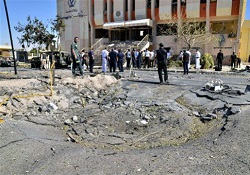Israel Braces for Surprise Attack on Eilat from Islamic State

Site of suicide attack by Islamic State affiliate Ansar Beit al Magdis in Egyptian Sinai. Source: AP
The Washington Free Beacon has a report on Israeli Army prepared for possible cross border attacks on resort area of Eilat by Islamic State affiliate Ansar Beit al Maqdis that has undertaken murderous attacks on Egyptian security forces.
Their tactics could include simultaneous penetration of the border fence at a number of points by large numbers of terrorists, cross border rockets, and the use of hang gliders and speedboats, according to Israel Radio.
“The scenario we are preparing for,” said IDF Col. Hen, in a blunt briefing, “is a terror threat directed against our forces and civilians in the Eilat area. The scenario is a multi-pronged attack, not just at one site, and we will likely have to deal with this challenge without prior warning.” Its members have inflicted heavy casualties on Egyptian troops who have been unable to track down the group’s leaders, whose lairs are believed to be in the mountainous central part of Sinai. In the past year alone, some 350 Egyptian soldiers, police officers, and intelligence personnel have been killed in the fight against the organization.
Col. Hen said that the IDF has taken steps to meet the threat and called for residents in the area to continue with their lives as normal.
Israel has cooperated with Egypt in its fight against Ansar Beit al Maqdis, waiving restrictions in the peace treaty with Egypt that prohibit the presence of troops, armored vehicles, and helicopters in the areas close to Israel’s borders. The Egyptian army has beefed up its forces on its side of the border.
The other threat that Israel could face would be an attack by Muslim Brotherhood and Islamic State supporters in the southern Jordanian trading hub of Maan, Perhaps this warning may be another reason for Israelis to vote for Likud and PM Netanyahu next Tuesday, March 17th.
An attack on Eilat and surrounding vicinity would produce significant economic losses from the tourist trade from Europe.
EDITORS NOTE: This column originally appeared in the New English Review.

